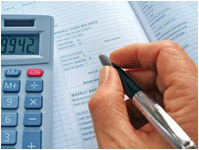|
|
 |
Taxes are imposed both at national and local levels, with the central government being the main taxing authority. The Ministry of Finance administers the majority of tax collections through:
• The Customs Department: responsible for collection of import and export duties.
• The Revenue Department: in charge of collecting income tax, value added tax, specific business tax, and stamp duty.
• The Excise Department which collects excise tax.
• Property tax and municipal tax are collected by local authorities.
In general, tax administration follows the self-assessment system. The taxpayer has a legal duty to declare his/her income and pay tax to the authorities. The declaration and tax payment are regarded to be correct. However, additional assessments may be made by authorities in case of failure to file tax returns or filing of false or inadequate tax returns. Appeal against additional assessments is allowed
Personal Income Tax
 An individual Thai citizen or alien who lives in Thailand for one or more periods totaling at least 180 days in any tax (calendar) year is, for tax purposes, deemed a resident of Thailand and subject to tax on all assessable income derived from sources within the country, whether paid within or outside Thailand, and on assessable income derived from foreign sources to the extent that it is brought into Thailand in a year in which income is received. A non-resident individual is subject to tax only on assessable income from Thai sources, regardless of payment location. Non-juristic partnerships (unregistered ordinary partnerships) and non-juristic bodies are also subject to personal income tax. Individual taxable income includes money and all other employment benefits received. An individual Thai citizen or alien who lives in Thailand for one or more periods totaling at least 180 days in any tax (calendar) year is, for tax purposes, deemed a resident of Thailand and subject to tax on all assessable income derived from sources within the country, whether paid within or outside Thailand, and on assessable income derived from foreign sources to the extent that it is brought into Thailand in a year in which income is received. A non-resident individual is subject to tax only on assessable income from Thai sources, regardless of payment location. Non-juristic partnerships (unregistered ordinary partnerships) and non-juristic bodies are also subject to personal income tax. Individual taxable income includes money and all other employment benefits received.
Corporate Income Tax
Companies and juristic partnerships organized under Thai law (hereinafter called Thai companies) are subject to taxation on their worldwide income, both from Thailand and foreign sources. Companies and juristic partnerships organized under foreign laws (hereinafter called foreign companies) are subject to taxation only on income from sources within Thailand. The Revenue Code takes the view that if foreign companies carry on business in this country, their income arising from or in consequence of such business constitutes Thai source income. A foreign company is deemed to be carrying on business in Thailand if it has an employee, representative, or go-between in Thailand to carry on its affairs, and thereby derives income or gains here. Therefore, a foreign company which establishes a branch office and derives income or gains there from in Thailand is deemed to be carrying on business in this country and thus subject to corporate income tax for its branch office net profit.
Wholly-owned subsidiaries of foreign companies established as companies or juristic  partnerships under Thai law are deemed Thai, not foreign, and subject to corporate income tax. A joint venture, defined by the Revenue Code as a business or profit-seeking enterprise carried on jointly by one company and another, or by a company and a juristic partnership, or by a company and/or a juristic partnership on one hand and an individual, non-juristic body of persons, ordinary partnership, or a juristic person on the other, is also subject to corporate income tax. Foreign companies engaged in international transportation fall within the scope of corporate income tax but have special provisions attached, as explained below.The corporate income tax rate is 30%, imposed with few exceptions on worldwide net profit received by Thai companies and on Thai source net profit received by foreign companies during the given tax year (i.e. accounting period). Foreign companies engaged in international transportation are subject to tax at the rate of 3% of gross ticket receipts collected in Thailand for passenger transportation and 3% of gross freight charges collected anywhere for transportation of goods from Thailand in lieu of tax on net profit. |
| |
Double Taxation
Thai tax treaties are mainly concerned with the avoidance of double taxation. The general principle is that the country in which the income arises (source country) has the prior right to tax and the country of residence will grant a relief (tax exemption or tax credit) from paying taxes twice on the same income. In addition, the treaties also provide for cooperation between governments in preventing the evasion of taxes. Thailand has entered into a number of treaties for the avoidance of double taxation. The scope of the Thai tax treaties covers taxes on income and on the capital of individual and juristic entities. The provisions of these tax treaties minimize or exempt certain types of income from taxation.
Value Added Tax (VAT)
 As of January 1, 1992, the Value Added Tax (VAT) replaced the business tax. The VAT is generally imposed at a single rate of 10% and applies, with a few exceptions, to goods and services supplied in or imported into Thailand. From April 1, 1999 until presently, the VAT rate has been reduced to 7%. The return to 10% has been delayed until further notice from the government.This 7% or 10% VAT already includes municipal tax, which is charged at the rate of one-ninth of the VAT rate. A zero per cent rate applies to certain businesses, for example, the export of goods or services, international transportation by sea or air, and the sale of goods and services to United Nations-related organizations. Small-scale traders whose annual turnover does not exceed Baht 1.2 million are not subject to VAT. The trader will charge VAT on the sale of goods or provision of services to the consumer. VAT paid by such trader to manufacturers or other traders for the purchase of goods or services is then deducted and the balance remitted to the Revenue Department. The tax thus accrues at each stage only on the value added. Under this system, the tax is eventually borne by the ultimate consumer, with manufacturers and traders regarded as collectors of tax on behalf of the Revenue Department. As of January 1, 1992, the Value Added Tax (VAT) replaced the business tax. The VAT is generally imposed at a single rate of 10% and applies, with a few exceptions, to goods and services supplied in or imported into Thailand. From April 1, 1999 until presently, the VAT rate has been reduced to 7%. The return to 10% has been delayed until further notice from the government.This 7% or 10% VAT already includes municipal tax, which is charged at the rate of one-ninth of the VAT rate. A zero per cent rate applies to certain businesses, for example, the export of goods or services, international transportation by sea or air, and the sale of goods and services to United Nations-related organizations. Small-scale traders whose annual turnover does not exceed Baht 1.2 million are not subject to VAT. The trader will charge VAT on the sale of goods or provision of services to the consumer. VAT paid by such trader to manufacturers or other traders for the purchase of goods or services is then deducted and the balance remitted to the Revenue Department. The tax thus accrues at each stage only on the value added. Under this system, the tax is eventually borne by the ultimate consumer, with manufacturers and traders regarded as collectors of tax on behalf of the Revenue Department.
Exclusions from VAT are businesses subject to specific business tax, businesses necessary for maintenance of life and social welfare (i.e. health care services, educational services, domestic transportation, sale of unprocessed agricultural products), cultural services, religious and charitable services. Traders who do only zero-rated supply business will not be required to collect VAT on their supplies, but can refund all VAT paid for purchase of goods and services from others. Services provided by traders residing abroad and utilized in Thailand are regarded as being rendered in Thailand and subject to 7% VAT. The recipient of such service must self-assess and remit VAT to the Revenue Department when paying service fees to overseas traders. |
|
| |
|
|
 |
|





